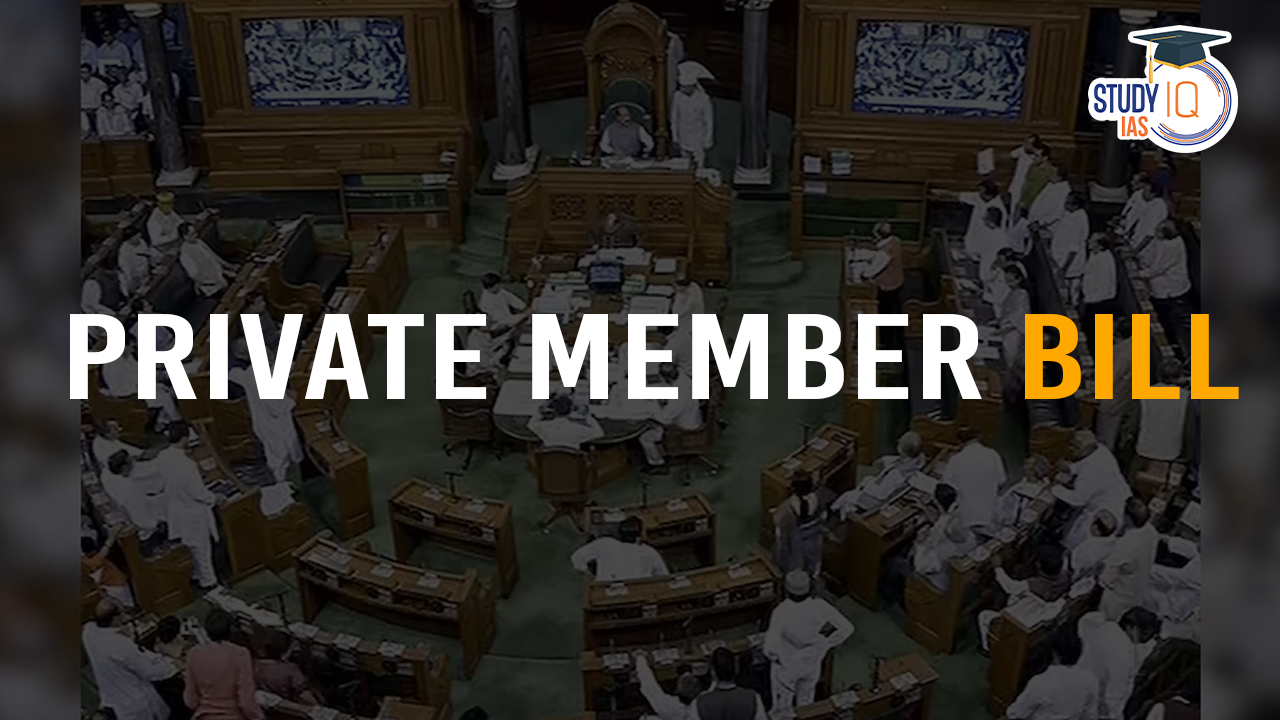Table of Contents
Context: The Private Member’s Bill holds immense potential to significantly enrich India’s legislative landscape.
About Private Member Bill
A Private Member Bill is a legislative proposal introduced in Parliament by a Member of Parliament (MP) who is not a Minister. This includes MPs from both the ruling party (if not a minister) and the Opposition.
- It is a legislative proposal introduced in Parliament by a member who is not part of the government, differentiating it from government bills presented by ministers.
- A Private Member’s Bill requires one month’s advance notice to be introduced in the House.
- In the case of a Public Bill, an advance notice of only 7 days needs to be given before introduction.
- Time for discussion on the Private Member’s Bill is fixed on alternate Fridays and in afternoon sittings.
- A private member can bring bills related to Constitutional Amendments, but they cannot initiate a Money Bill.
- Private members can introduce a maximum of 3 notices for Private Member Bills during a Session.
- Rejection of a private member’s bill by the House has no implication on the parliamentary confidence in the government or its resignation.
- Also, drafting the bill is the responsibility of the concerned member.
| Facts about Private Member Bill |
|
Significance of Private Member Bill
- Platform for Individual Expression: PMBs allow MPs, especially those not in the executive, to raise issues, propose legislation, and represent the concerns of their constituents beyond party lines.
- Democratic Deepening: PMBs enhance deliberative democracy by encouraging debate on diverse social, economic, and political concerns often overlooked in official legislation.
- Policy Innovation & Social Awareness: PMBs bring forth unconventional or emerging issues—e.g., Right to Disconnect, Transgender Rights—initiating public and parliamentary discourse.
- Cross-Party Collaboration: PMBs foster bipartisan engagement and sometimes generate consensus on socially relevant matters (e.g., senior citizen healthcare proposals).
- Check on Executive Dominance: They help balance executive-legislative power, allowing Parliament to remain a forum for diverse voices and not just a rubber stamp for the Cabinet.
- Legislative Incubation: Even if not passed, PMBs often influence government legislation later (e.g., RTI Act, Transgender Act), acting as policy testbeds.
Challenges Faced by Private Member Bill
- Low Success Rate: Since Independence, only 14 PMBs have become law. None have passed both Houses since 1970.
- Inadequate Time Allocation: Only Fridays are reserved, and even these are often overridden by government business, budget discussions, or disruptions.
- Lack of Political Priority: The ruling party may not support PMBs—even from its own MPs—due to fear of deviating from the official legislative agenda.
- Disruptions and Adjournments: Frequent House disruptions mean that PMBs are often not taken up for discussion at all, reducing them to symbolic exercises.
- No Institutional Support: PMBs often lack research and drafting support, leading to poorly framed proposals that cannot withstand constitutional or legal scrutiny.
- Anti-Defection Constraints: The Tenth Schedule (Anti-Defection Law) restricts MPs’ independence, especially from the Treasury Bench, discouraging them from deviating from the party line.
Reforms to Strengthen the Private Member Bill (PMB) Mechanism
- Safeguard Time for PMBs: Amend Rules of Procedure to protect Fridays for PMBs, ensuring they are not overridden except during national emergencies.
- Set Up a PMB Review Committee: A dedicated body could screen PMBs for quality, constitutionality, and relevance, and recommend a priority list for debate.
- Fast-Track Mechanism for High-Impact Bills: Allow Bills with bipartisan support or wide public interest to be taken up quickly, regardless of their origin.
- Extend Working Hours of Parliament: Instead of displacing PMB time, extend the sitting hours to accommodate both government and private members’ business.
- Introduce a ‘Ten-Minute Rule’ (U.K. Model): Allow short speeches for PMBs at the time of introduction to ensure more ideas are at least debated or recorded, increasing visibility.
- Boost Research Support for MPs: Provide access to legal experts and policy researchers to help MPs draft sound legislation, improving the quality and seriousness of PMBs.
|
Significant Private Member Bills And Some Facts |
||||
| S. No. | Name of the Bill | Year Introduced | Introduced By (MP) | Outcome/Impact |
| 1 | Hindu Marriage (Amendment) Bill | 1952 | Prabhakar Kunte | Contributed to the Hindu Marriage Act, 1955 |
| 2 | Proceedings of Legislature (Protection of Publication) Bill | 1956 | Feroze Gandhi | Passed into law, protected the publication of legislative proceedings |
| 3 | Supreme Court (Enlargement of Criminal Appellate Jurisdiction) Bill | 1968 | Anand Narain Mulla | Passed into law; expanded SC’s criminal appellate jurisdiction |
| 4 | Indian Penal Code (Amendment) Bill | 1967 | Diwan Chaman Lall | Influenced later laws on dowry-related violence |
| 5 | Transgender Persons (Protection of Rights) Bill | 2014 | Tiruchi Siva | Passed by the Rajya Sabha in 2015; influenced the 2019 Government legislation |
| 6 | Right to Information-related Bills | 1990s (multiple) | Various MPs | Paved the way for the RTI Act, 2005 |
| 7 | Women’s Reservation Bills | Multiple Attempts | Various MPs (e.g., Geeta Mukherjee) | Though not passed, it kept the issue in the political spotlight |
Significant Private Members Bill and Some Facts
- Since Independence, only 14 PMBs have been passed and received presidential assent, and none have cleared both Houses since 1970.
- In the 17th Lok Sabha (2019-24), 729 PMBs were introduced in the Lok Sabha and 705 in the Rajya Sabha.
- However, only two in the Lok Sabha and 14 in the Rajya Sabha were ever discussed.
- In the 18th Lok Sabha, only 20 MPs have introduced PMBs so far.
- During the inaugural and Budget Sessions of 2024, 64 PMBs were introduced in the Lok Sabha, but not a single one was discussed.
| UPSC PYQ |
Q. With reference to the Parliament of India, consider the following statements: (2017
Which of the statements given above is/are correct? (a) 1 only (b) 2 only (c) Both 1 and 2 (d) Neither 1 nor 2 Answer: D |


 SLAPP Suits: Meaning, Examples, Impact o...
SLAPP Suits: Meaning, Examples, Impact o...
 Finance Commission of India, Articles an...
Finance Commission of India, Articles an...
 High Number of Pending Cases in Supreme ...
High Number of Pending Cases in Supreme ...

























